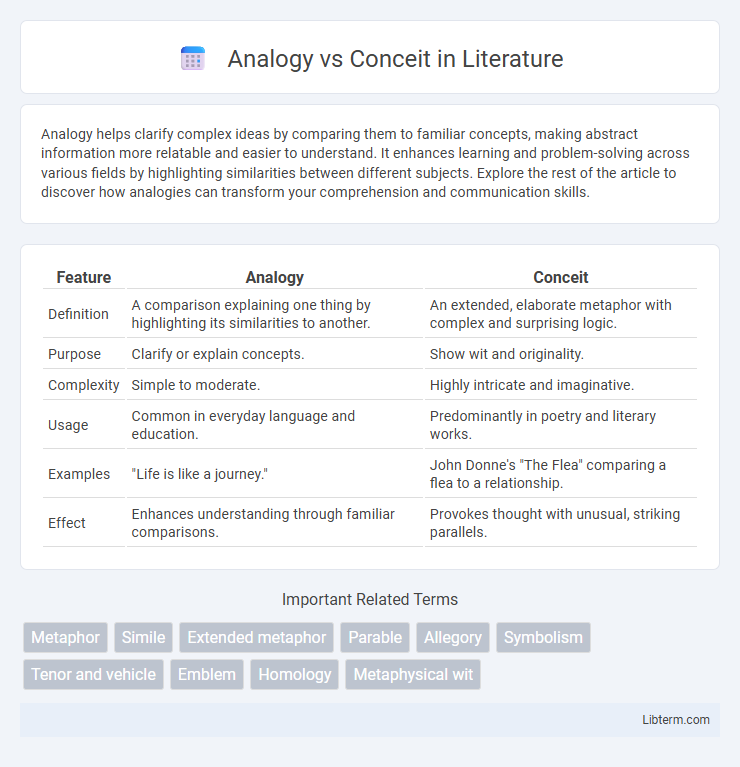Analogy helps clarify complex ideas by comparing them to familiar concepts, making abstract information more relatable and easier to understand. It enhances learning and problem-solving across various fields by highlighting similarities between different subjects. Explore the rest of the article to discover how analogies can transform your comprehension and communication skills.
Table of Comparison
| Feature | Analogy | Conceit |
|---|---|---|
| Definition | A comparison explaining one thing by highlighting its similarities to another. | An extended, elaborate metaphor with complex and surprising logic. |
| Purpose | Clarify or explain concepts. | Show wit and originality. |
| Complexity | Simple to moderate. | Highly intricate and imaginative. |
| Usage | Common in everyday language and education. | Predominantly in poetry and literary works. |
| Examples | "Life is like a journey." | John Donne's "The Flea" comparing a flea to a relationship. |
| Effect | Enhances understanding through familiar comparisons. | Provokes thought with unusual, striking parallels. |
Understanding Analogy and Conceit
Analogy involves comparing two different things based on a shared characteristic to clarify or explain an idea, often used in everyday language and scientific reasoning. Conceit is an extended metaphor with a complex and often elaborate comparison between seemingly unrelated objects or ideas, frequently found in poetry and literary works. Understanding analogy and conceit enhances comprehension of figurative language by recognizing the levels of complexity and creativity in their comparisons.
Defining Analogy in Literature
Analogy in literature is a comparison between two different things that highlights a similarity in their relationships or functions, often used to clarify complex ideas or to create vivid imagery. It operates on the principle of logical parallelism, where one relationship is explained through another, making abstract or unfamiliar concepts more accessible to readers. This differs from a conceit, which is an extended metaphor marked by unusual or elaborate comparisons intended to provoke thought or highlight wit.
Exploring the Concept of Conceit
Conceit is a highly imaginative and elaborate metaphor that draws a striking comparison between two seemingly unrelated subjects, intensifying the reader's engagement through intellectual wit and creativity. Unlike a straightforward analogy, conceits often involve complex, extended imagery that challenges conventional perceptions and deepens thematic resonance in literary works. This literary device is prominent in metaphysical poetry, where poets like John Donne use conceit to explore abstract ideas such as love and spirituality with intricate and unexpected correlations.
Key Differences Between Analogy and Conceit
Analogy draws a straightforward comparison between two different things based on a shared characteristic to clarify or explain an idea, while conceit is a more elaborate, often startling or unconventional metaphor that creates a complex and imaginative connection. Analogy is commonly used in logical or explanatory contexts to enhance understanding, whereas conceit typically appears in poetry or literature to provoke thought and highlight ingenuity. The key difference lies in simplicity and purpose: analogy simplifies for clarity, whereas conceit amplifies for artistic effect.
Historical Development of Analogy and Conceit
The historical development of analogy traces back to classical rhetoric and philosophy, where it served as a foundational method for explaining complex ideas through comparison, particularly in Aristotle's works on logic and metaphor. Conceit, emerging prominently in Renaissance and Metaphysical poetry, evolved as an extended, elaborate metaphor that challenges readers by linking seemingly disparate concepts with intellectual ingenuity, as exemplified by poets like John Donne and George Herbert. While analogy emphasizes clarity and logical resemblance, conceit prioritizes striking imagery and emotional complexity, reflecting distinct historical and literary purposes.
Usage of Analogy in Poetry and Prose
Analogy in poetry and prose serves as a powerful literary device that clarifies complex ideas by drawing comparisons between two seemingly unrelated concepts, enhancing reader comprehension and engagement. Poets frequently use analogy to evoke vivid imagery and emotional resonance, while prose writers apply it to simplify abstract arguments or elaborate on themes. This technique bridges familiarity and novelty, enriching narrative depth and persuasive impact across diverse genres.
Conceit in Metaphysical Poetry
Conceit in metaphysical poetry embodies an extended, often elaborate metaphor that draws striking parallels between seemingly unrelated objects or ideas, demonstrating intellectual ingenuity and emotional depth. Unlike a simple analogy, a conceit pushes creative boundaries through intricate comparisons, often blending abstract concepts with concrete imagery to evoke surprise and provoke thought. John Donne's poetry exemplifies this technique, where the conceit intricately connects spiritual and physical realms, enhancing the poem's thematic complexity.
Effectiveness of Analogy vs Conceit
Analogy effectively clarifies complex ideas by drawing straightforward, relatable comparisons that enhance understanding and retention. Conceit, often employing more elaborate and surprising metaphors, creates a striking impact but may require deeper interpretation, affecting immediate clarity. The effectiveness of analogy lies in its accessibility, while conceit excels in provoking thought and emotional response.
Examples of Analogy and Conceit in Famous Works
Analogy in literature often appears as a straightforward comparison, such as in Shakespeare's "As You Like It," where the world is likened to a stage. Conceit, a more elaborate and surprising metaphor, shines in John Donne's poem "The Flea," where a flea is used to symbolize the union between lovers. These examples highlight how analogy simplifies complex ideas, while conceit employs intricate and imaginative imagery to provoke deeper thought.
Choosing Between Analogy and Conceit in Writing
Choosing between analogy and conceit in writing depends on the desired depth of comparison and audience engagement. Analogy offers straightforward, familiar comparisons that clarify complex ideas, making it ideal for educational or explanatory texts. Conceit employs elaborate, surprising, or far-fetched comparisons that provoke thought and reveal deeper insights, suiting poetic or literary work seeking to challenge readers.
Analogy Infographic

 libterm.com
libterm.com